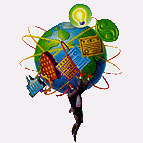Introduction
The Sogo Shosha Business Model

Just a few years ago many were suggesting that the revolution in information technology would eliminate the need for middlemen, causing the sogo shosha, or integrated trading company to become superfluous. But companies like ours have proved hardier than expected.
The sogo shosha is commonly said to have no counterpart outside Japan, and this distinctiveness makes it tough to explain our business to non-Japanese. Within Japan “the shosha-man” – a dashing figure that jets around the world making business deals – is a character that appears regularly on TV dramas and the like, and most people have at least a vague idea of what a sogo shosha is. Even in Japan, though, the number of people who know the realities of our business is rather limited.
To understand today’s integrated trading companies, we need to understand their origins. These companies merged as an inevitable concomitant of resource-poor Japan’s quest to survive by importing raw materials, processing them, and exporting finished products. The shape of Japanese industry has changed radically over the years in response to developments in the global economy, and at a number of junctures the future of the sogo shosha has been called into question. But the trading companies have successfully ridden each wave of change and continued to advance. It seems fair to say that confronting change head on has been part of our industry’s DNA ever since Sakamoto Ryoma founded Kameyama Shachu, the company said to have been the first sogo shosha, in the mid-nineteenth century. Also, the sogo shosha is a bundle of what Peter Drucker calls “knowledge workers.”
Just as manufacturers cannot survive without constantly developing new products, our type of company has been able to grow only by constantly enhancing its market development, financial, logistical, and other capabilities.
Building on this past, the sogo shosha of today has become a trading and investment organization that competes with companies of other types in some areas but also performs a unique and important role as a risk taker. What makes this possible is our combination of diversity and scale. Since our companies operate in such a broad range of fields, we can diversify our exposure. And the scale of our business strengthens our ability to cope with even substantial risks. To manage these risks, we rely heavily on our worldwide network of offices, which provide a rich supply of primary information. This is a business model that obviously cannot be built overnight, and so it can be said that the barriers to new entrants into our industry is very high.
The ever-increasing complexity and accelerating pace of change in today’s world make it all the more important to be able to match up different parties’ needs. In government the call is for comprehensive policymaking and implementation capabilities, cutting across bureaucratic dividing lines. In academia, people are proclaiming the need for interdisciplinary studies. And in the world of business, the sogo shosha’s ability to deliver comprehensive solutions is likely to make it an increasingly crucial player.
The "IT Revolution" boom gave rise to the many new business models, but most have already fallen by the wayside. The business model of the integrated trading, on the other hand, is likely to survive as a strong model of development – provided, of course, we continue constantly revising and improving it.
Sumitomo Corporation’s Core Competence: Integrated Corporate Strength
Trust: Based on Sumitomo’s business philosophy, we have cultivated the trust of our customers over the years. This is the most fundamental and valuable asset of our business.
Global Network: With offices, subsidiaries and associated companies worldwide, our business network provides a basic platform for the prompt and secure transfer of goods, funds and information.
Global Relations: Our Company has established close and multifaceted relations with over 100,000 business partners around the world across all industries.
Intellectual Capital: The wealth of know-how, experience and information accumulated by our skilled personnel in diverse fields is also an important element of our solid business foundation.
Risk Management: Only an integrated trading company with decades of business experience can expertly manage diverse risks associated with credit standing, market, and enterprise operations.
Financial Services: This includes fee collection/payment, provision of capital, project financing and advanced financing services such as securitization of assets.
Business Development: We excel in business creation, which involves identifying promising new products, developing new markets, and organizing appropriate business operation.
Logistics Solutions: In addition to the ability to provide a wide range of integrated logistic services, we also have the capacity to develop and deploy services to match demand and supply of cargoes, trucks, and warehouse space.
IT Solutions: This involves the ability to build Supply Chain Management (SCM) systems and to support network business.



